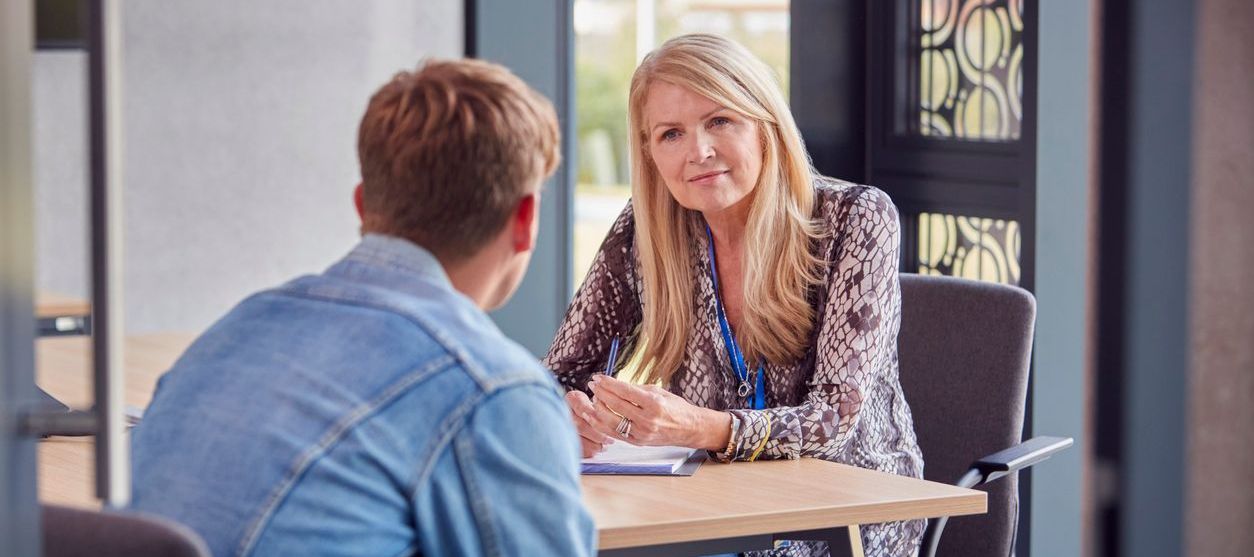-
Counselling Therapy
for school Issues in
Youths & Teens
Find Qualified Counsellors & Therapists
at Affordable Fees Near You For Online
Or In Person Sessions. Request a Free
Quote, review & book online!
What is School Issues Counselling for Youth & Teens?
Youth & Teens School Issues Counselling Therapy is a specialised form of counselling aimed at addressing various challenges and concerns related to academic performance, school-related stressors, and social dynamics among young individuals. This type of counselling provides support, guidance, and strategies to help youth and teens thrive academically, emotionally, and socially within the school environment.
Common Issues Addressed in School Issues Counselling
Youth & Teens School Issues Counselling addresses various issues, including:
- Academic stress: Coping with academic pressure, performance anxiety, test-taking difficulties, or perfectionism.
- School refusal: Addressing school avoidance, truancy, or reluctance to attend school due to anxiety, bullying, or social challenges.
- Peer relationships: Navigating social dynamics, friendship conflicts, peer pressure, or feelings of social isolation within the school setting.
- Bullying and harassment: Dealing with bullying, harassment, discrimination, or cyberbullying from peers or classmates.
- Learning difficulties: Managing learning disabilities, attention-deficit/hyperactivity disorder (ADHD), executive functioning challenges, or academic underachievement.
- Transitions and adjustments: Adjusting to new schools, grade levels, academic programs, or transitions such as moving, divorce, or family changes.
- School-related trauma: Processing traumatic experiences, school violence, accidents, or incidents impacting mental health and well-being.
Benefits of School Issues Counselling Therapy
Youth & Teens School Issues Counselling offers numerous benefits, including:
- Academic support: Providing strategies, study skills, and academic accommodations to enhance learning, organisation, and time management.
- Emotional resilience: Building coping skills, stress management techniques, and emotional regulation strategies to navigate school-related stressors effectively.
- Social skills development: Enhancing communication skills, assertiveness, and conflict resolution abilities to foster positive peer relationships and social interactions.
- Self-esteem enhancement: Promoting self-confidence, self-esteem, and self-advocacy to foster a positive school experience and overall well-being.
- Problem-solving abilities: Developing problem-solving skills, decision-making abilities, and goal-setting techniques to address academic challenges and setbacks.
- School engagement: Increasing motivation, school attendance, and participation in extracurricular activities through targeted interventions and support.
- Family-school collaboration: Facilitating communication, collaboration, and advocacy between parents, caregivers, educators, and school personnel to address academic and emotional needs effectively.
Goals of School Issues Counselling Therapy
The goals of Youth & Teens School Issues Counselling may include:
- Academic success: Supporting academic achievement, improving study habits, and addressing learning difficulties or academic underachievement.
- Emotional well-being: Enhancing emotional resilience, coping mechanisms, and stress management skills to manage school-related stressors effectively.
- Social integration: Facilitating social skills development, peer relationship building, and peer support networks to foster a sense of belonging and inclusion within the school community.
- School attendance: Addressing school refusal, truancy, or attendance issues through targeted interventions, coping strategies, and family-school collaboration.
- Bullying prevention: Providing strategies, assertiveness skills, and support systems to address and prevent bullying, harassment, or victimisation within the school environment.
- Transition support: Assisting with transitions, adjustments, and school changes by providing emotional support, coping strategies, and resources to navigate transitions successfully.
- Advocacy and empowerment: Empowering youth and teens to advocate for their academic and emotional needs, access support services, and navigate school systems effectively.
What to Expect in School Issues Counselling Sessions
In Youth & Teens School Issues Counselling sessions, individuals can expect to:
- Discuss school-related challenges, concerns, and goals in a confidential and supportive environment.
- Identify academic strengths, areas for improvement, and specific challenges impacting academic performance and well-being.
- Develop personalised strategies, study skills, and coping mechanisms to address academic stressors, learning difficulties, or school-related issues.
- Explore social dynamics, peer relationships, and social skills development to foster positive peer interactions and social integration within the school community.
- Collaborate with the counsellor to develop an action plan tailored to the youth or teen's academic and emotional needs, incorporating family-school collaboration, support systems, and resources.
- Receive ongoing support, feedback, and guidance from the counsellor to monitor progress, address setbacks, and achieve academic and emotional goals.
When to Seek Help:
Youth and teens may consider seeking counselling for school-related issues when they:
- Experience persistent academic stress, anxiety, or low motivation affecting school performance and attendance.
- Encounter difficulties with peer relationships, social interactions, or feelings of social isolation within the school environment.
- Exhibit changes in behavior, mood, or attitude towards school, such as school avoidance, truancy, or defiance.
- Encounter bullying, harassment, or discrimination within the school setting that impacts emotional well-being and safety.
- Face challenges adjusting to school transitions, academic changes, or life events affecting school engagement and functioning.
Finding the Right Counsellor
When seeking a counsellor for Youth & Teens School Issues Counselling, consider the following factors:
- Specialisation: Look for a counsellor who specialises in working with youth, adolescents, or teens and has experience addressing school-related issues, academic stress, and social dynamics.
- Approach: Choose a counsellor whose approach aligns with your goals, preferences, and needs for counselling, whether it's cognitive-behavioral therapy, solution-focused therapy, or family-systems therapy.
- Credentials and experience: Verify the counsellor's credentials, licensure, and experience working with youth and teens experiencing school-related challenges, academic stressors, or mental health concerns.
- Compatibility: Select a counsellor who creates a safe and supportive environment, fosters rapport and trust, and demonstrates empathy and understanding towards youth and teens' academic and emotional needs.
School Issues Counselling FAQs
- How can counselling help with academic stress and performance anxiety? Counselling can provide support, strategies, and coping mechanisms to manage academic stress, improve study habits, and address performance anxiety through relaxation techniques, time management skills, and cognitive-behavioral interventions.
- What should I do if my child is experiencing bullying or harassment at school? Report bullying incidents to school authorities, document the incidents, and seek counselling support to address the emotional impact of bullying, develop coping strategies, and advocate for anti-bullying measures.
- Is it normal for youth and teens to experience social challenges or peer conflicts at school? Yes, social challenges and peer conflicts are common during adolescence as young individuals navigate social dynamics, peer relationships, and identity development. Counselling can provide tools and support to navigate these challenges effectively.
- How can I help my child transition to a new school or academic program successfully? Support your child's transition by providing emotional support, communicating openly about the changes, connecting with school personnel, and accessing counselling support to address adjustment issues, anxiety, or concerns related to the transition.
- What role can parents or caregivers play in supporting their child's academic and emotional needs? Parents or caregivers can play a crucial role by fostering open communication, providing emotional support, advocating for their child's academic and emotional needs, collaborating with educators, and accessing counselling or support services as needed.
LGBTQ+ Considerations:
For LGBTQ+ youth and teens experiencing school-related challenges, it's essential to find a counsellor who is affirming, supportive, and knowledgeable about LGBTQ+ identities and experiences. Look for counsellors who create a safe and inclusive space for discussing LGBTQ+ concerns, identity development, and resilience-building strategies within the school context.
Next Steps for Help and Recovery
If you're a youth or teen experiencing school-related challenges or if you're a parent or caregiver concerned about a young person's well-being, here are some next steps you can take:
- Schedule a Consultation: Reach out to a qualified counsellor or therapist specialising in youth and teens' school-related issues to schedule a consultation and discuss your concerns, goals, and needs.
- Identify Specific Challenges: Identify specific challenges or concerns impacting academic performance, social dynamics, or emotional well-being within the school environment.
- Develop Coping Strategies: Work with the counsellor to develop personalised coping strategies, study skills, and social skills to address school-related stressors and challenges effectively.
- Engage in Family-School Collaboration: Collaborate with educators, school personnel, and support services to address academic and emotional needs, advocate for accommodations, and foster a supportive school environment.
- Access Additional Support: Seek additional support services, resources, or community organisations specialising in youth and teens' academic, social, and emotional well-being, such as tutoring programs, peer support groups, or LGBTQ+ youth organisations.
Find Counsellors & Therapists Near You

Find Qualified Counsellors & Therapists
Near You, Get A Free Quote, Read Reviews, & Hire!
Online Or In Person Sessions.



